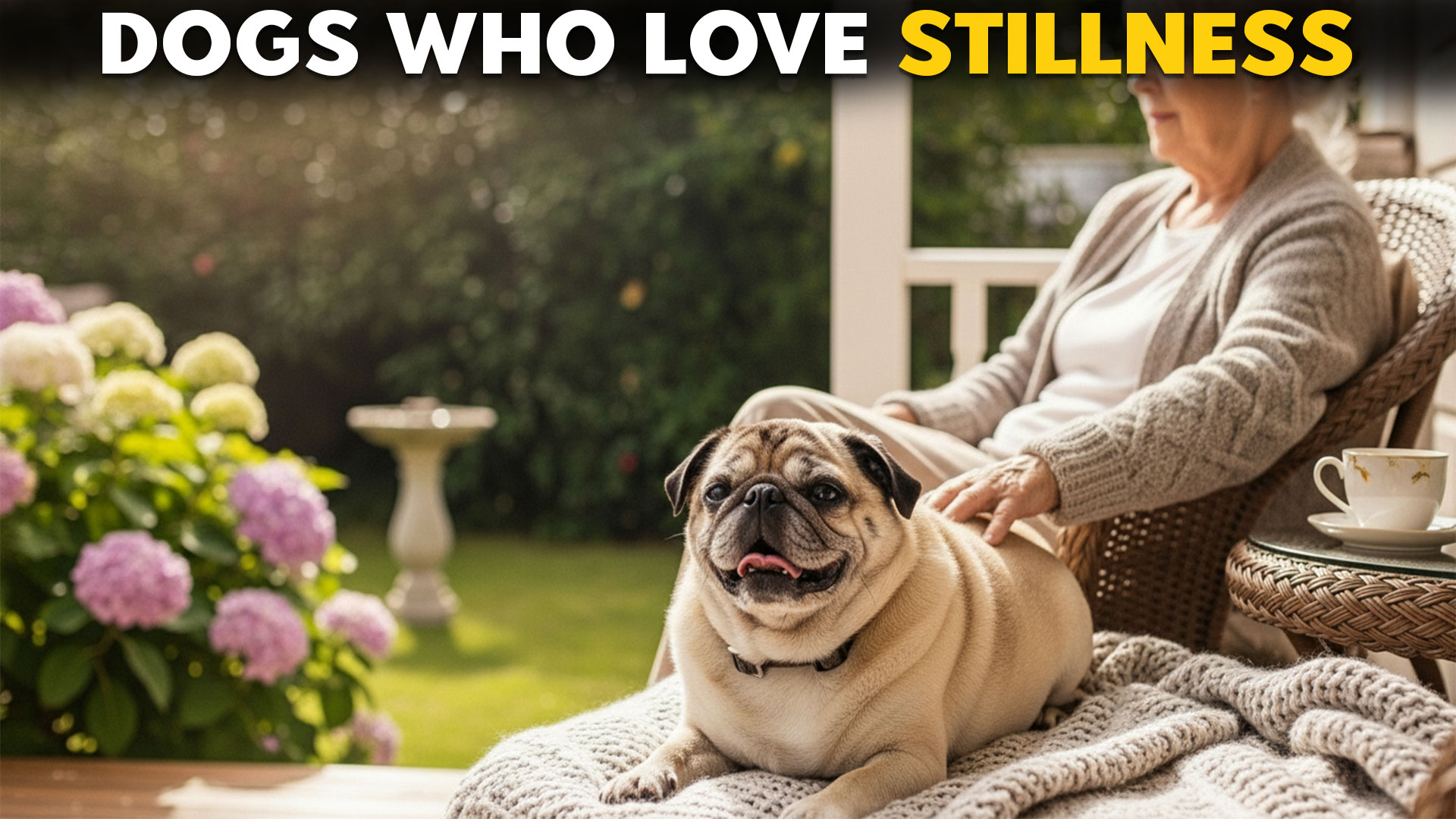For many seniors, life’s later chapters invite a slower rhythm—morning walks that linger, afternoons spent with a book, and a deep appreciation for calm companionship.
The right dog can complement this stage of life beautifully, offering affection, lightheartedness, and a steady presence without demanding high-octane activity.
But not all breeds are created equal when it comes to energy levels, trainability, and overall temperament. Choosing a dog that matches a more relaxed lifestyle can make all the difference in both comfort and joy.
Easygoing breeds bring a special gift: they adapt gracefully to a gentle pace, thrive on routine, and prioritize closeness over constant adventure. They still enjoy play and daily walks, but without the whirlwind intensity of more energetic breeds.
In this article, we’ll explore some of the best canine companions for seniors savoring slowness—dogs that embody patience, calm, and the kind of loyalty that makes every quiet moment feel full.
Easygoing Dog Breeds For Seniors Savoring Slowness
1. French Bulldog
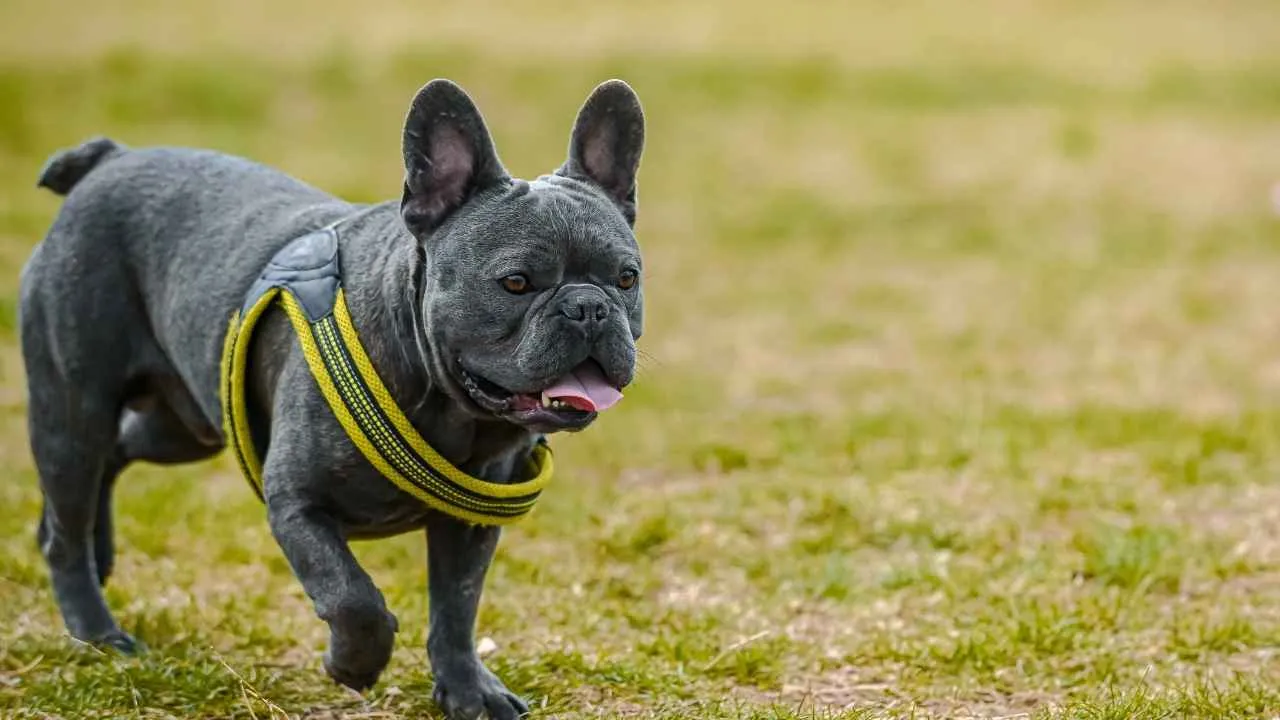
For seniors who appreciate calm routines, the French Bulldog is a wonderful match. This small but sturdy pup is happiest with short walks and long stretches of togetherness, making them ideal for those who savor a slower pace of life. Their steady temperament ensures they blend easily into relaxed households.
One of their charms lies in their compact build—under 28 pounds but full of personality. They were once the favored companions of Parisian artisans, admired for their loyalty and good humor. That same easygoing nature continues to define them today.
French Bulldogs require minimal grooming, needing only light brushing and gentle cleaning of their signature facial folds. Their short coat makes upkeep easy, allowing elderly owners to focus more on companionship than constant care.
Due to their flat faces, Frenchies are sensitive to heat and heavy exercise. A cool environment and short, shaded strolls are best for their comfort. Seniors who enjoy quiet indoor activities will find this breed happy to stay close by.
What makes them especially suited for older adults is their adaptability: playful without being overwhelming, affectionate without being demanding.
Quick Tips
Choose soft bedding to support their compact frame.
Keep play sessions short to avoid overexertion.
2. Cavalier King Charles Spaniel
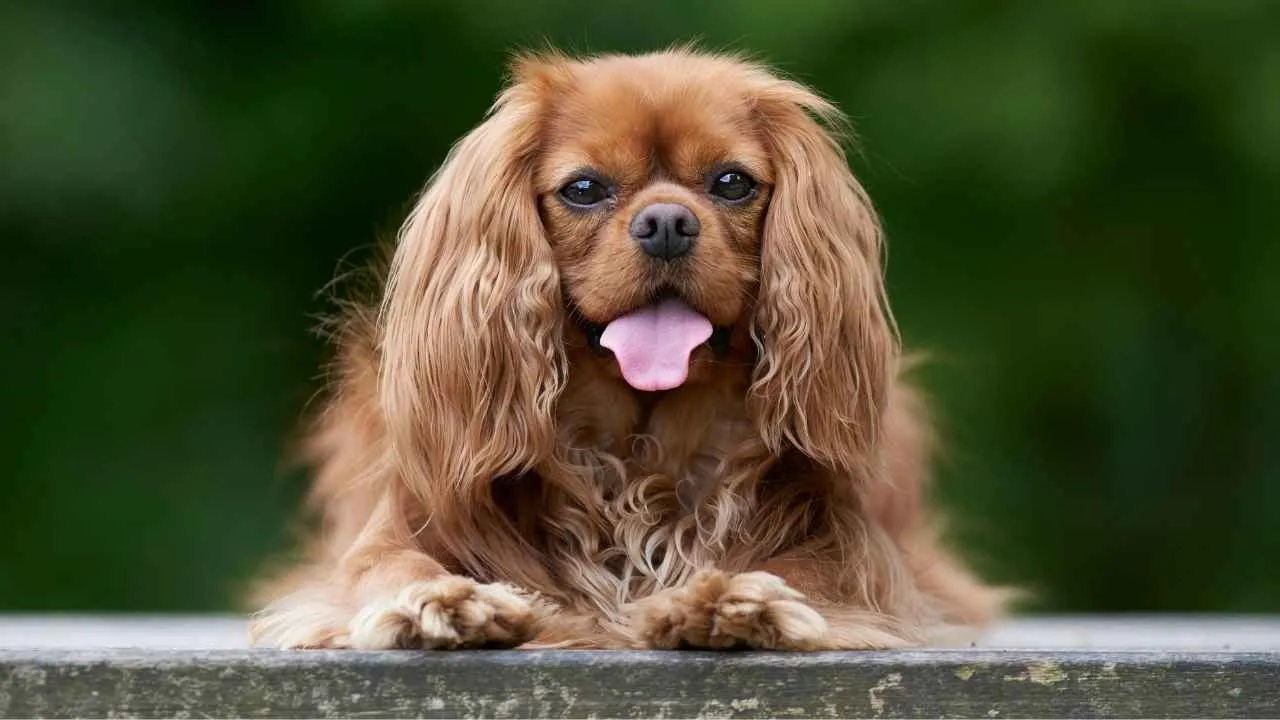
For seniors seeking a companion that thrives on closeness, the Cavalier King Charles Spaniel is a gentle match. This breed adores sitting beside its owner, whether during a quiet afternoon or a stroll. Their calm presence helps create a steady rhythm in daily life, perfectly suited to savoring slowness.
Cavaliers are small, with soft, silky coats and expressive eyes that convey warmth. They were originally bred as lapdogs for British nobility, and their affectionate nature has endured through the centuries. Today, they remain one of the most people-oriented breeds.
Their friendly disposition extends to everyone they meet—children, visitors, and other pets alike. This makes them versatile companions in social settings as well as quiet ones. They adjust easily to new environments, offering a sense of comfort and reliability to their owners.
While grooming is a little more involved due to their flowing coats, regular brushing keeps them looking polished. Light daily exercise, such as a short walk or gentle play indoors, is enough to keep them healthy. Their moderate needs make them manageable for seniors who prefer balance over intensity.
What sets the Cavalier apart is its emotional sensitivity; it often seems tuned to its owner’s mood. For those savoring life at a gentler pace, this intuitive companionship feels both reassuring and uplifting.
Quick Tips
Brush their coat several times a week to avoid tangles.
Schedule yearly heart checkups, as the breed can be prone to heart issues.
3. Pug
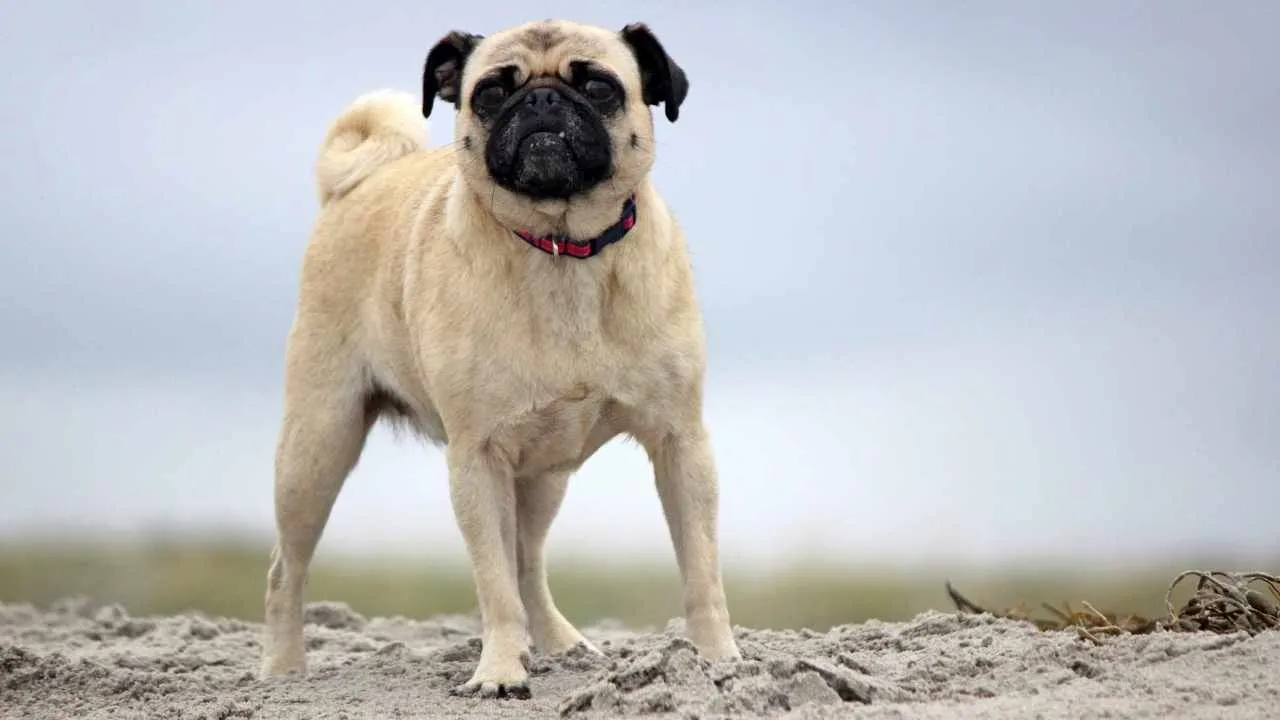
For seniors who enjoy a touch of humor alongside calm fellowship, the Pug is a delightful choice. Their playful antics bring lightness to everyday life, yet they are just as content curling up quietly nearby. This balance makes them a wonderful fit for those savoring a slower, more joyful routine.
Pugs are charming with round heads and deep-set eyes that seem to sparkle. Their small and sturdy size means they fit well in small apartments. Originating in China as cherished pets of royalty, they carry an old-world charm that still captures hearts today.
One of the Pug’s strongest traits is its devotion to people. They thrive on closeness and rarely stray far from their owners, which can be especially comforting for those living alone. Their loyalty makes them feel like true friends rather than just pets.
Care needs are moderate: their short coats are simple to maintain, but their flat faces mean they’re sensitive to heat and heavy activity.
According to Pug Village, seniors can easily meet their low exercise needs with short, leisurely walks and light indoor play. Maintaining a healthy diet is also important, as Pugs can gain weight quickly.
What makes the Pug stand out for older adults is its cheerful resilience. They bring laughter and affection into quiet homes, creating moments of joy while keeping pace with a relaxed lifestyle.
Quick Tips
Feed measured portions to help prevent weight gain.
Provide soft toys for gentle play and mental stimulation.
4. Basset Hound
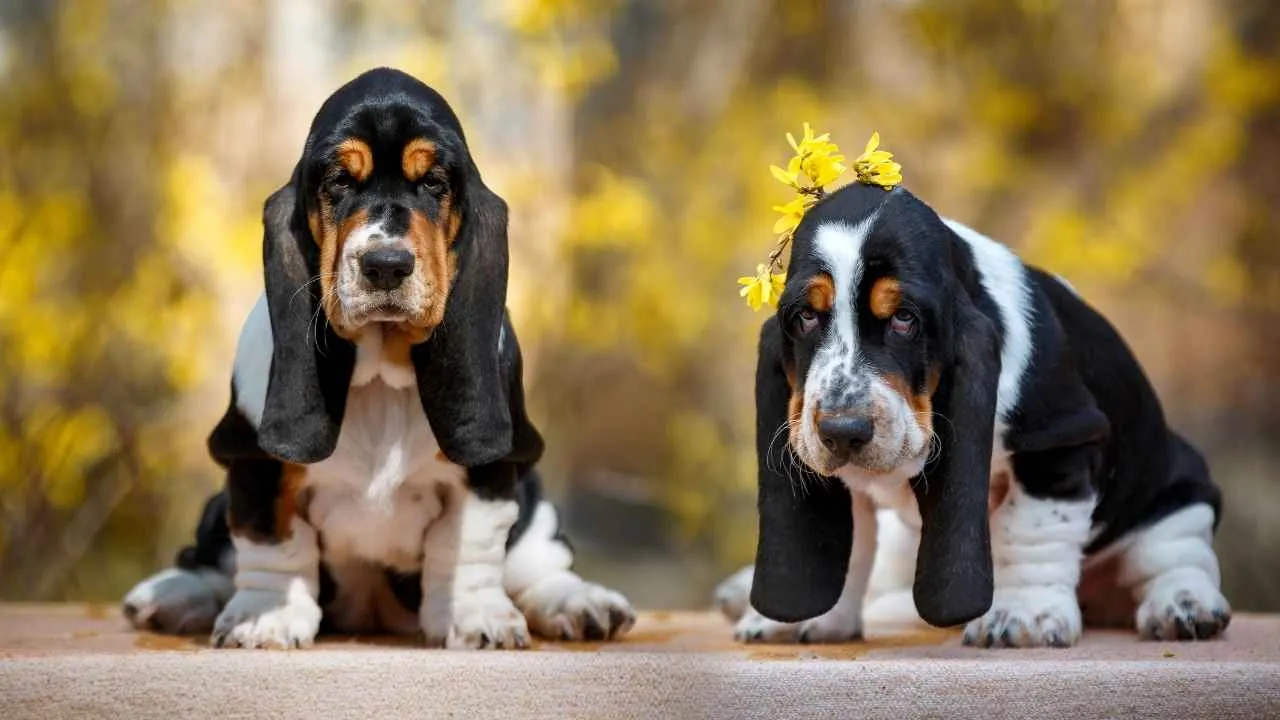
For seniors who enjoy steady company without the chaos of high-energy breeds, the Basset Hound is an excellent fit. Their famously droopy ears, soulful eyes, and calm nature make them ideal partners for slower days. They are happiest with short walks and plenty of time lounging close by.
Basset Hounds have a sturdy build, but their short legs and low-slung bodies limit their speed. Originally bred for scent tracking, they still carry an impressive nose, though they prefer ambling along at a measured pace. This mix of strength and slowness suits seniors who value consistency.
Their relaxed temperament extends into the home, where they enjoy long naps and companionship. They are affectionate yet not demanding, often content to be near their people without constant activity. This balance makes them easy to manage despite their medium size.
Grooming is fairly simple thanks to their short coats, though their long ears require regular cleaning. Care should also be taken to avoid weight gain, as extra pounds can strain their backs and joints. With mindful feeding and light activity, they remain healthy and comfortable.
For older adults, the Basset Hound offers a loyal, mellow friendship. Their unhurried pace mirrors a slower lifestyle, making them a lovable match for seniors savoring life’s quieter moments.
Quick Tips
Use a harness on walks to protect their back.
Provide chew toys to satisfy their natural tendency to gnaw.
5. Shih Tzu
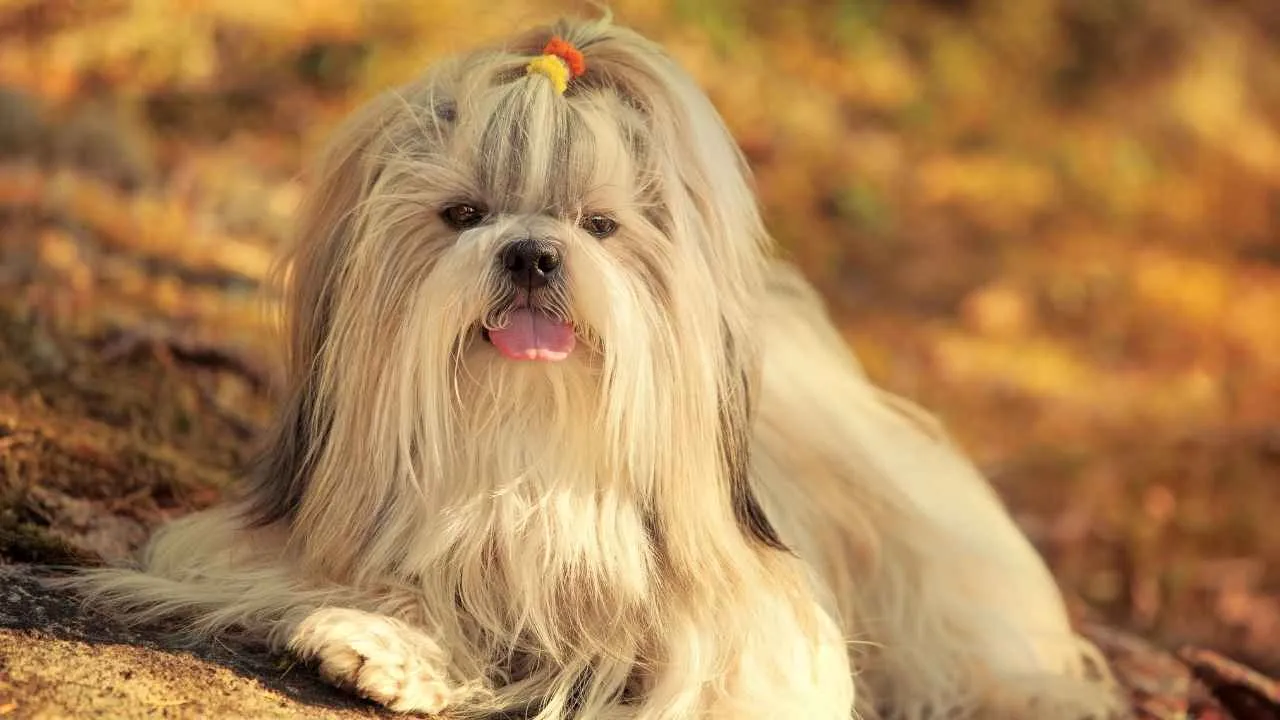
The Shih Tzu was bred to sit beside emperors in ancient China, and their heritage as lapdogs is still obvious today. They thrive on closeness, preferring to be nestled near their owners rather than seeking independence. This affectionate temperament makes them an ideal companion for seniors who value quiet partnership.
The discussion below on Quora also highlights why a Shih Tzu is recommended for senior citizens.
Grooming is a more central part of life with a Shih Tzu. Their long, flowing coats require daily brushing unless kept trimmed in a puppy cut. While it takes commitment, many find the routine of caring for such a beautiful coat rewarding.
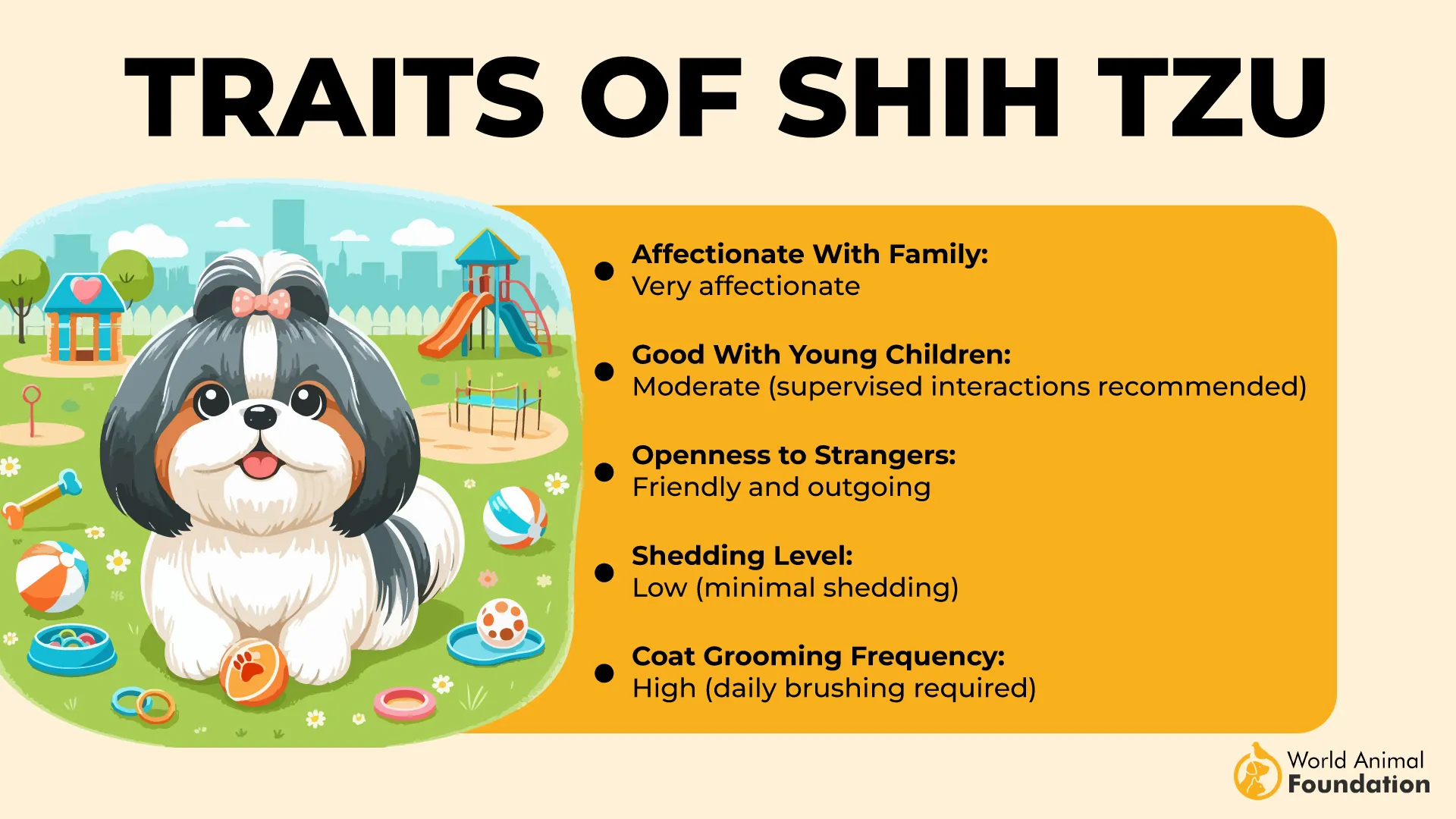
Adaptability is one of their strongest traits. They do well in apartments or retirement communities, needing very little space to feel at home. Their sociable and calm manner helps them adjust easily.
When it comes to activity, Shih Tzus are content with short, gentle walks and occasional playtime indoors. They are not built for strenuous exercise, which makes them perfectly suited for a slower lifestyle.
For seniors, this breed offers both elegance and warmth. A Shih Tzu provides emotional comfort, matching a quieter rhythm with affection and loyalty.
Quick Tips
Choose a shorter cut if daily brushing feels overwhelming.
Protect their eyes by trimming hair around the face.
6. Maltese
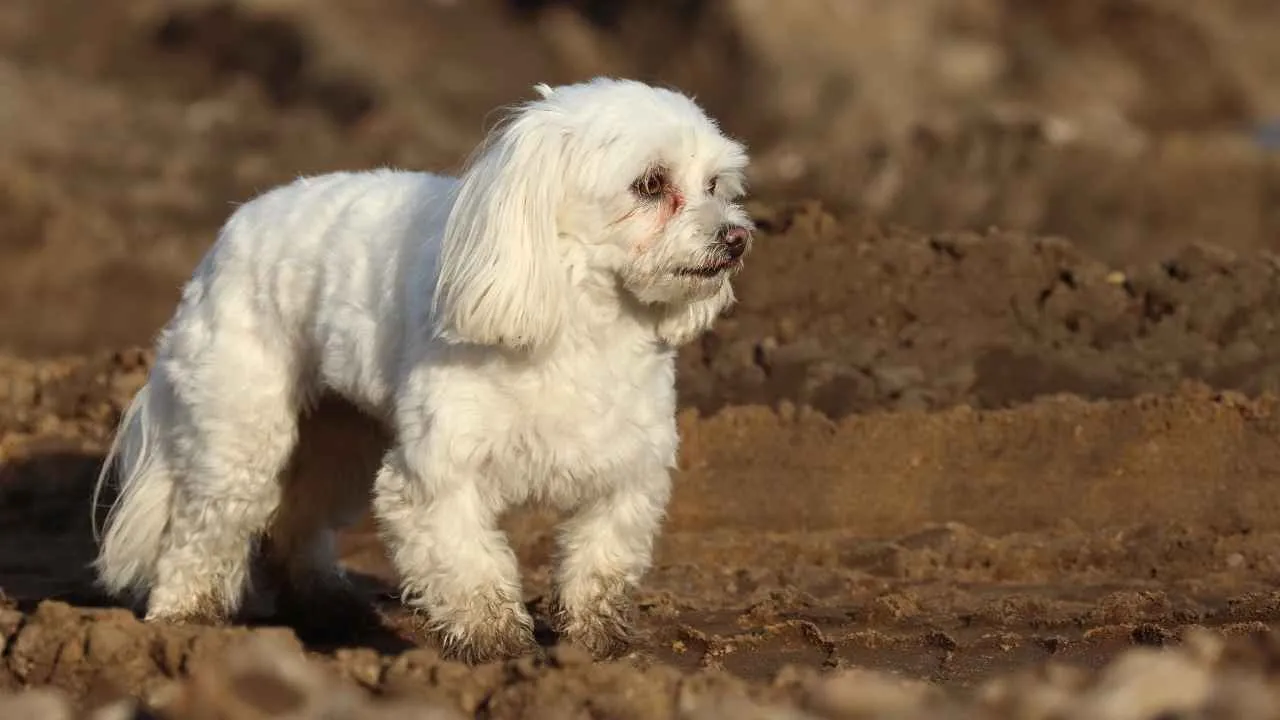
Despite their delicate appearance, they bring plenty of charm and cheer. According to the AKC, the Maltese is one of the smallest companions, often under 7 pounds, making them easy to carry, lift, and handle. Their size alone makes them appealing to seniors who prefer a lighter, more manageable pet.
Their beautiful white coats require thoughtful care. Regular brushing prevents matting, and many owners choose professional grooming for ease. A short trim can make maintenance simpler while preserving their elegant look.
The Maltese has centuries of history as a beloved companion dog. Ancient families prized them for their affectionate personalities, a legacy that remains clear in their devotion to people today.
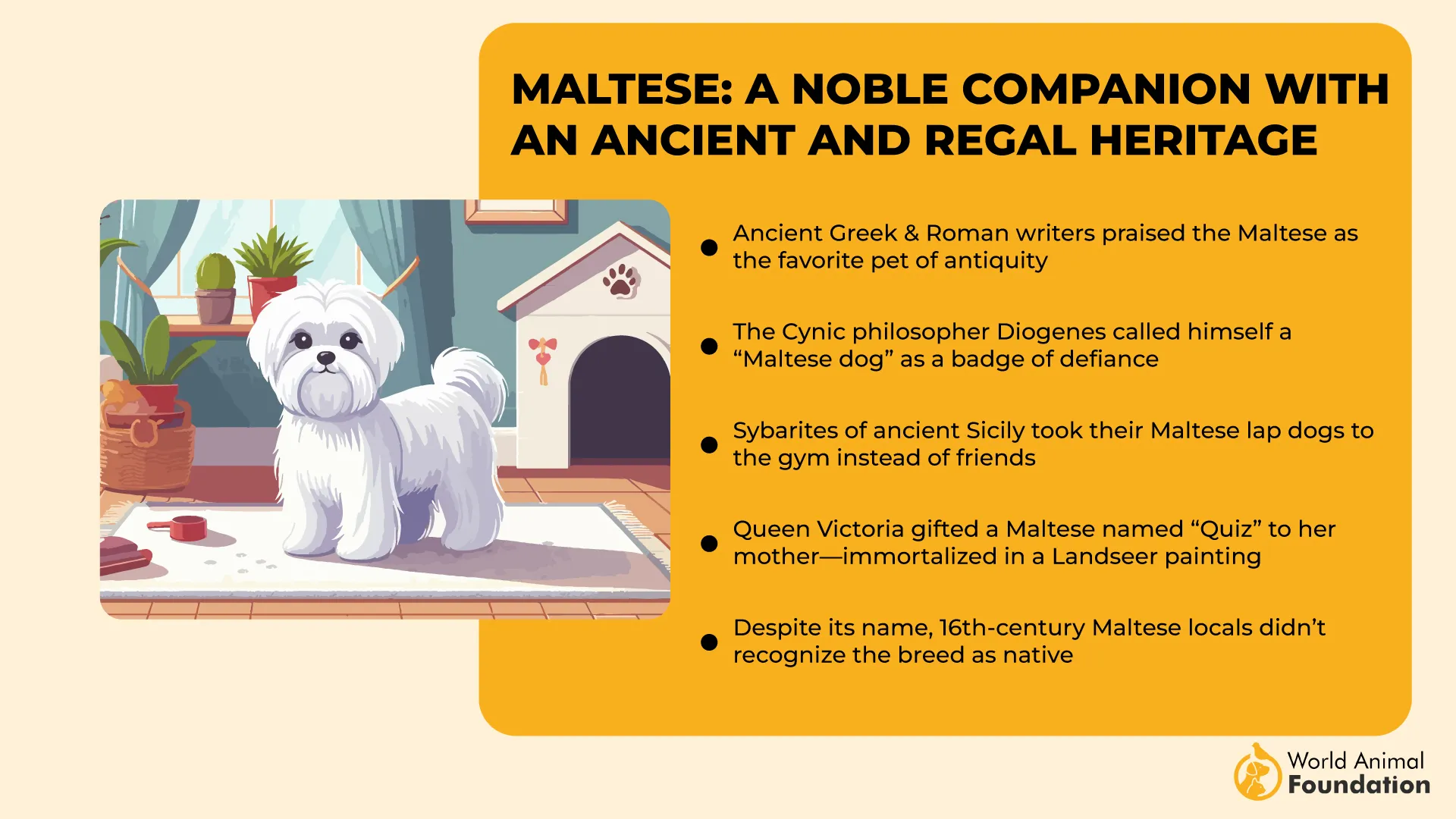
Temperament-wise, they are lively but not overwhelming. They enjoy gentle play and thrive on attention, but their exercise needs remain low. This balance makes them ideal for seniors who want a lively presence without strenuous care.
For older adults, the Maltese offers a perfect blend of lightness, loyalty, and low demands. They bring companionship that brightens the day while fitting comfortably into slower routines.
Quick Tips
Provide steps or ramps to help them onto furniture safely.
Use a harness instead of a collar to protect their delicate neck.
7. Bichon Frise
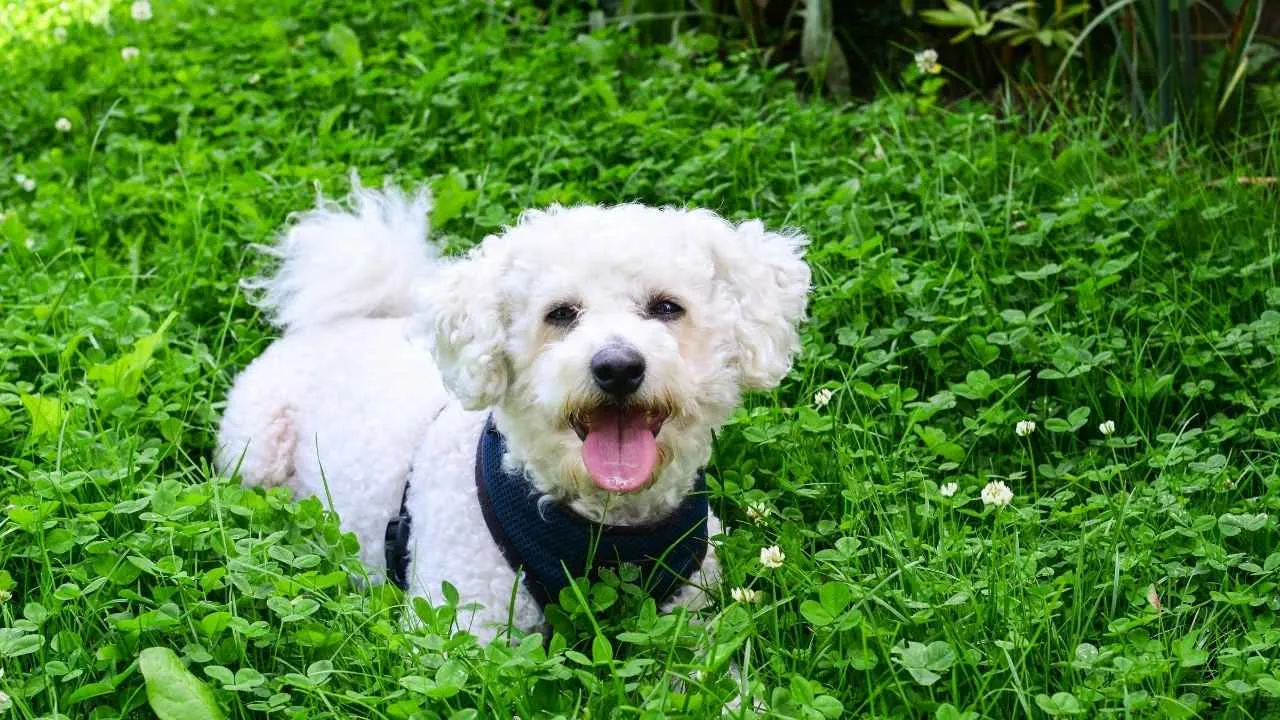
What makes the Bichon Frise immediately endearing is its joyful personality. With a cottony white coat and a spring in their step, they bring cheer to any room. Their optimistic energy blends well with seniors who want positivity without high demands.
A key feature of the Bichon is its hypoallergenic coat, which sheds very little. While this helps keep homes cleaner, it also means grooming must be regular. Brushing and professional trims every few weeks are necessary to maintain their fluffy look.
Though playful, Bichons do not require long runs or intense activity. A short daily walk and light games indoors keep them content. This makes them easy to manage while still keeping life engaging.
They are also known for their friendliness toward people and other pets. In retirement communities or social households, they adapt well, often spreading their cheerful nature wherever they go.
For seniors, the Bichon Frise brings joy in a compact, easy-to-handle form. Their sunny spirit pairs beautifully with a slower lifestyle, offering comfort alongside consistent affection.
Quick Tips
Keep grooming appointments consistent to avoid matting.
Incorporate short play sessions to balance their playful side.
FAQs
1. Why are easygoing breeds a better choice for elderly owners?
Easygoing breeds are generally calm, adaptable, and less demanding in their daily needs. For elderly owners, this means the dog can provide steady companionship without requiring long runs or hours of playtime. These breeds tend to enjoy shorter walks, relaxed routines, and plenty of cuddle time, making them a natural fit for seniors who value a slower pace of life.
2. How much daily care and exercise do easygoing breeds typically need?
Most easygoing dogs thrive on light activity such as one or two short walks and a bit of indoor play. They are satisfied with moderate engagement, focusing more on companionship than high-energy exercise. Daily care usually involves basic grooming suited to the breed, along with regular feeding, affection, and mental stimulation through gentle games or toys.
3. What traits should seniors look for when choosing a dog breed?
Seniors should prioritize breeds with calm temperaments, manageable sizes, and moderate exercise needs. Low-maintenance grooming is often helpful, although some enjoy the routine of brushing or coat care. Above all, traits like loyalty, affection, and adaptability create a strong bond and ensure the dog fits seamlessly into a senior’s lifestyle.
Conclusion
Choosing the best dog breeds for seniors means finding affectionate dogs with a calm demeanor and manageable needs. Small dogs like Maltese dogs are often well-suited for smaller living spaces, while hypoallergenic dog breeds such as Bichon Frise or Havanese dogs help reduce the chance of allergic reactions.
Other breeds, such as Pekingese dogs, Miniature Schnauzer, West Highland White Terrier, Chihuahua, or Cocker Spaniel, also make great companions for an elderly person, thanks to their gentle nature and cheerful disposition.
These great lap dogs are affectionate, intelligent dogs whose playful personalities and loving nature make them incredibly affectionate furry companions.
Unlike active breeds that require extensive exercise, easygoing pets are low-energy dogs that thrive on light exercise, light play, and occasional professional grooming.
Their ability to form strong bonds and serve as devoted companions enhances mental health, enriches family members’ lives, and makes dog ownership a joyful experience. With their loyal companion spirit, many dogs become the best dogs for seniors, offering comfort without being overly demanding.


